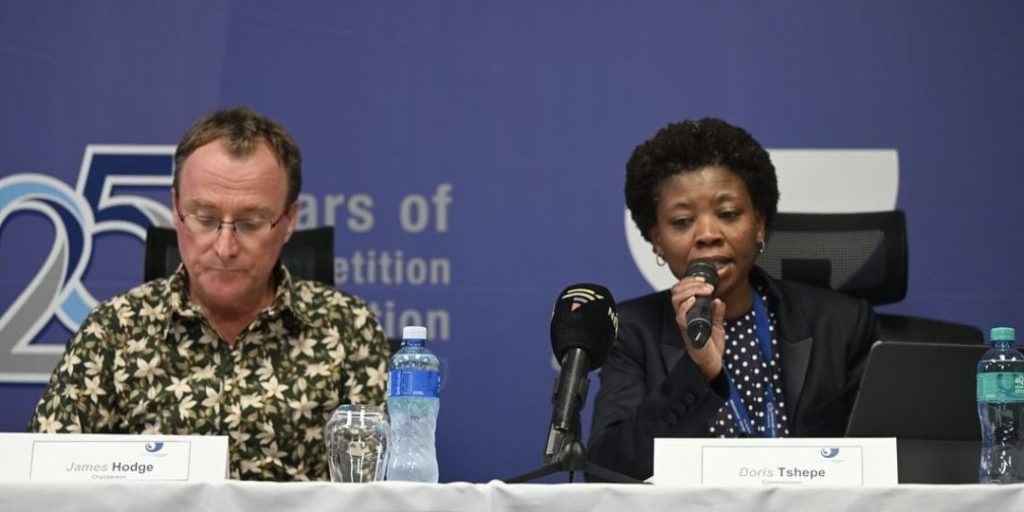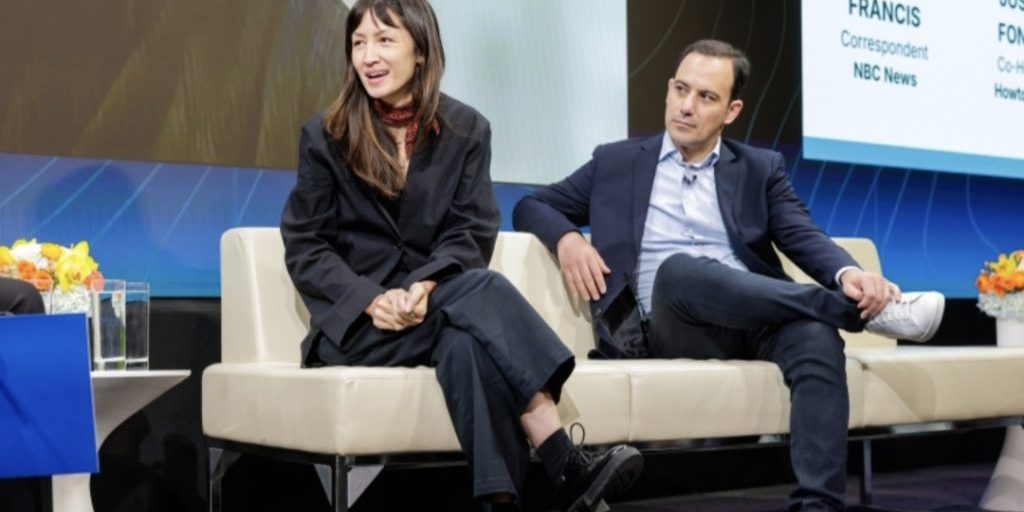Commission seeks ‘win-win solutions’ for news market with AI, digital and social media
PICTURE: Chief Economist James Hodge and Commissioner Doris Tshepe (@compcomsa)
The news media plays a crucial role in upholding freedom of expression and democracy. However, it faces financial challenges due to a decline in traditional advertising revenue.
The Media and Digital Platforms Market Inquiry (MDPMI) explored the impact of digital platforms, Al and social media on news media, and proposes possible solutions.
A provisional report released today follows a 16-month investigation starting in October 2023 which saw publishers, community publications and digital platforms make submissions. Further submissions are now invited for the next six weeks, as part of the Inquiry before the report can be finalised.
The MDPMI investigated ‘whether there are market features in digital news content distribution that restrict, distort or impede competition and adversely affect South Africa’s news media sector’ (read more here).
This is against the backdrop of some 87% of South Africans getting their news online, mostly via mobile phones, and social media and search engines becoming primary news sources. It is evidenced that news videos are preferred by young demographics over text, and these are mostly consumed on social platforms.
Traditional ad revenue for print media has declined by 40%, while SABC ad revenue has dropped by 47%, and digital ad revenue cannot fully compensate for such losses.
Shrinking newsrooms have seen journalism jobs halved, and there has been an increased casualisation of journalists. Many community and regional newspapers have shut down.
Al chatbots pose a new threat to news media by reducing referral traffic and capturing content value on their platforms, while digital platforms increase costs for news media by demanding platform-specific content formats, constant algorithm optimisation and misinformation management
Many news organisations have turned to non-advertising revenue (subscriptions, donations, content licensing and events), but subscriptions are not viable for most South Africans, limiting access to news.
The advertising revenue decline threatens media diversity and plurality, further concentrating power among a few large media companies.
News content is valuable for search engines, for driving user engagement, and is widely used to power personalised feeds and ‘query less search’ features like Google Discover. Most users consume news directly on search engine results pages (SERPs) or via YouTube, leading to less than half of news queries generating clicks to news websites, which reduces revenue for news media.
Read SANEF calls on the Competition Commission to get Big Tech to compensate media for content, here, and Press Council makes join submission to the Competition Commission, here, and Report on platforms’ on news market months late as collapse continues, here
Google benefits far more than news media:
- R200m in referral traffic to news websites in 2023
- R800m – Google’s estimated benefit from news content
- R300m-R400 – The estimated imbalances in value annually
And the bias in its algorithm disadvantages South African media, favouring foreign news sources and YouTube-hosted videos.
The evidence before the Inquiry is unequivocal:
- a majority of South African consumers use social media as their primary source of news
- platforms like YouTube, Meta, X and TikTok drive news consumption
- Meta and X have deprioritised posts with links, reducing referral traffic
- news organisations struggle to monetise views on YouTube, and
- social media algorithms amplify misinformation
Al tools use news content for training without proper compensation. Local media content has been used in Al training, though historically in small amounts, but its importance is expected to grow.
Chatbots are increasingly used for news, functioning similarly to search engines, and survey evidence confirms rising chatbot news consumption, with many users relying on AI news summaries. These reduce referral traffic to news sites, however, harming media outlets not included in content deals.
Most South African media have not blocked Al crawlers due to the opt-out system, lack of awareness, and reliance on Google and Microsoft search traffic which they cannot afford to lose.
AdTech is used by the media to monetise digital traffic to their websites and advertisers to place ads across digital content. But evidence indicates that Google is super-dominant across AdTech, achieved through acquisitions and entrenchment practices that favour its AdTech partners over rivals
News media receive only 60% of programmatic ad spend after AdTech and agency fees, while direct sales have dropped to 40-60%. AdTech also holds a data advantage, and local language advertising (except for English and Afrikaans) is not supported on Google AdTech.
The Inquiry’s provisional remedies aim to address media challenges.
While media bargaining has been attempted globally, it has faced issues. Meta blocked news, and Google payments favoured mainstream media.
The Inquiry seeks sustainable, win-win solutions but may impose a five to 10% digital levy on search, social media and Al companies if no agreement is reached.
In terms of Search, the key remedies are:
- to restore referral traffic by adjusting search algorithms to support South African news media and reduce bias toward foreign platforms
- to support monetisation by sharing anonymised user data and providing SEO assistance
- compensation: Google should pay R300m to 500m over three to five years to address lost revenue, benefiting diverse media
- to allow media to opt out of Al summaries without losing search traffic, and
- collective negotiation, to enable media to negotiate agreements on funding and policies
In terms of social media, the key remedies are:
- to boost referral traffic – Meta and X should restore South African news visibility
- to increase revenue – YouTube and Meta should expand and improve revenue-sharing
- to fight misinformation – platforms should be held accountable and fund fact-checking, and
- to support media by sharing data, funding oversight and promoting digital literacy
In terms of Gen AI, the key remedies are:
- to allow news media to collectively negotiate Al deals to secure fair compensation
- to enable media to opt out of Al summaries without losing search visibility, and
- to ensure Al chatbots don’t favour global media partners over South African media, and maintain referral traffic
In terms of AdTech, the key remedies are that:
- global reforms should apply to South Africa. If Google is broken up in the US and EU, the same should happen in South Africa
- there must be AdTech transparency. EU competition remedies, including price transparency for Google Ad Exchange, should apply in South Africa
- there must be fairer fees and access, the end of extra fees on third-party ad exchanges, lower direct sales fees and an end to YouTube ad exclusivity, and
- there must be local language support, and Google AdTech must support all South African languages for advertising
In terms of stakeholders, specifically government and business, key remedies include:
- proposed measures such as tax breaks and committed ad spending to sustain independent media
- community media exemption to allow collective national ad sales to boost revenue, and
- the establishment of a donation-based fund to support media organisations
Google and Microsoft will have to negotiate annual contributions to the oversight institutions, namely the Press Council and the Broadcasting Complaints Commission of South Africa (BCCSA).
News media and broadcasters will only be eligible for compensation if they also adhere to this regulatory oversight.
- The Commission’s panel comprised Chief Economist James Hodge (chair) and media veteran Paula Fray, with 12 members of a technical team, a project administrator and research assistants
- Read the press release from the Commission here
- Responses to the Inquiry regarding the provisional findings, proposed remedies, and recommendations must be sent to [email protected] by close of business on 7 April 2025 and should include supporting evidence where relevant




